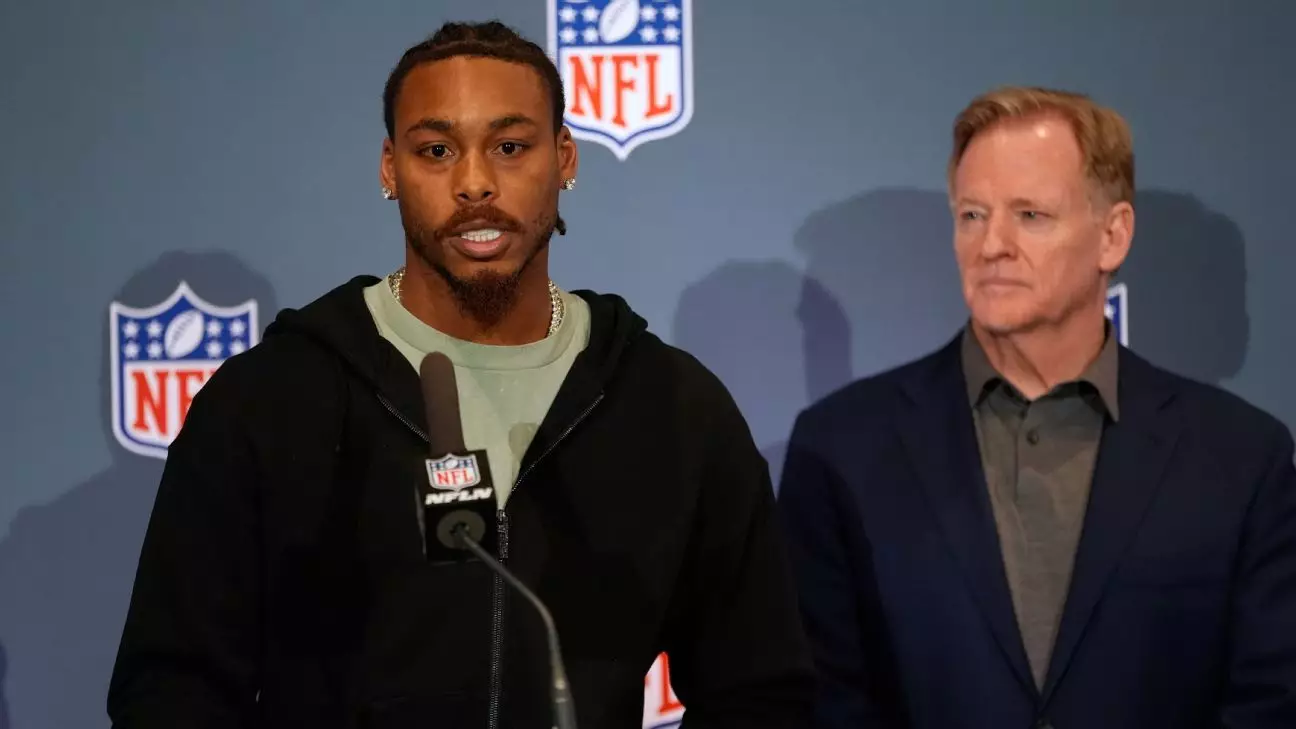In a moment that could redefine the landscape of American football, Minnesota Vikings star Justin Jefferson captured the essence of excitement and hope at a recent NFL press conference. Flashing a wide grin, he joyfully executed an “Olympic Griddy” dance before announcing a monumental approval that could see NFL players participating in flag football during the 2028 Olympic Games in Los Angeles. This unanimous decision from the league’s 32 owners marks a seismic shift in the global reach of football, and for Jefferson, who has consistently been one of the league’s most electrifying athletes, it represents the fulfillment of a childhood dream.
“I’m just at a loss for words,” exclaimed Jefferson, embodying the thrill of the moment. He expressed his deep-seated desire to succeed on such a prestigious stage, reflecting on childhood memories watching athletes capture gold medals in various sports. The admission that football hasn’t previously held a place in the global athletic arena adds a layer of significance to this decision—it’s not merely about one player or one sport; it’s about ushering football into global prominence.
Broadening Horizons for the NFL
Troy Vincent, NFL’s executive vice president of football operations, mirrored Jefferson’s enthusiasm, stating that this development could provide a platform for showcasing some of the most gifted athletes from around the world. With aspirations to create Olympic competitors that echo the pride of the original “Dream Team” from 1992, Vincent’s vision combines both excitement and responsibility. His statement reflects a keen understanding of the transformative power of global exposure.
In a world increasingly shrunk by globalization, the NFL’s step to include flag football at the Olympics opens up a myriad of possibilities. It presents the chance for American football to mingle with international athleticism, potentially pulling in talent from around the globe who may have heritage ties to the NFL but haven’t had pathways to professional play in the league. This inclusivity could be revolutionary for the sport.
The Road Ahead: Challenges and Commitments
However, while the positivity around the proposal is palpable, significant hurdles also loom on the horizon. The NFL must still negotiate many details with the NFL Players Association, Olympic committees, and national governing bodies to bring these aspirations to fruition. These discussions will cover crucial aspects such as player safety, club obligations, and how players can represent their own countries while simultaneously balancing their NFL commitments.
Jefferson himself has shown tempered enthusiasm regarding his potential participation. Although he holds Olympic dreams close, he has acknowledged the complexities involved. With three seasons left until the Olympics, the realities of aging and potential injuries necessitate careful consideration. For every star player, the opportunity to compete on an international stage comes with its own set of stakes and consequences.
Building a Learning Curve
The Pro Bowl Games offered a glimpse of what participating in an Olympic flag football team might entail, with positive feedback likening the experience to playful games from childhood. With the excitement of flag football comes a unique learning curve; as highlighted by Vikings linebacker Brian Asamoah II, adapting from traditional football to flag football requires a distinct set of skills, including speed, maneuverability, and strategic thinking. Respecting players devoted to flag football also underscores the need for thoughtful selection criteria; high-caliber athletes already participate in this specialized form of the game, and their contributions should not be overlooked.
Moreover, incorporating wider training aspects will demand a nuanced approach to the calendars and schedules of both the NFL and Olympic committees. NFL Executive Peter O’Reilly emphasized that ensuring compatibility between training for two different sports is paramount, especially considering the tight schedules that football players face during their seasons.
What emerges from these discussions is a fervent commitment towards growth—not just of football, but of the community that surrounds it. If approached thoughtfully, the opportunity to field a flag football team might accelerate not only the international growth of the NFL but also foster engagement with a younger generation eager to experience football outside of traditional boundaries.
Embracing this novelty, the league has a chance to expand its footprint in sports history and inspire future generations, captivating hearts worldwide with the excitement of American football in a new light. The path ahead is laden with uncertainty, yet for the athletes like Justin Jefferson, the prospect of leaving an indelible mark on the Olympic stage just might be worth every effort.

